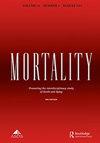死亡和临终课程学生遗愿清单分析:来自三所美国大学的数据
IF 1
0 HUMANITIES, MULTIDISCIPLINARY
引用次数: 0
摘要
摘要本文描述并分析了在三所本科大学的《死亡与临终》课程中使用遗愿清单作业的方法,以此来教授学生关于死亡的知识,同时也了解了这一代人对死亡的渴望和焦虑。来自三所不同大学的“死亡与临终”教授们,每个人都有一个类似的任务,要求学生们列出自己的“遗愿清单”,或者列出他们在死前想完成的事情。对146份清单的分析,总共包含2210个清单项目,揭示了这些不同学生群体的相似之处,主要是他们对旅行的关注,与亲人共度时光,以及对临终准备的有趣缺乏关注。本研究结果对死亡教育和卫生保健提供者具有启示意义,支持先前关于死亡焦虑和死亡超越的学术研究。关键词:大学教学;死亡与临终遗愿清单;生死焦虑;披露声明;作者声明对本文的研究、作者身份和/或出版没有任何经济支持。作者简介莱西·j·里特(lacey J. Ritter)博士,梅西山大学(Mount Mercy University)社会学助理教授和卫生系系主任,教授社会学和公共卫生方面的各种课程,包括《最后的旅程:死亡与临终社会学》。Ritter博士于2021年获得Mount Mercy University的年度教师奖,并喜欢与学生一起担任顾问,实习协调员和教授。她的研究专长包括性与健康,对老年人的健康结果特别感兴趣,尽管她喜欢在各种主题领域进行社会心理学研究。里特于2017年获得佛罗里达州立大学博士学位。她最近的出版物包括《健康和衰老中的性偏差:揭示晚年生活的亲密关系》,编辑的《高等教育的变化面孔:从婴儿潮一代到千禧一代》,以及各种期刊文章。Anisah Bagasra博士是肯尼索州立大学心理科学系副教授,专门从事美国穆斯林和非裔美国人信仰社区的行为健康研究。她在建立传统和在线本科课程方面的经验促使克拉夫林大学(Claflin University)开设了心理学专业,在加入KSU之前,她还率先推出了在线学位课程。她教授广泛的心理学课程,并指导从事本科研究的学生,重点是少数民族社区的文化能力研究。具体的研究兴趣包括伊斯兰心理学,文化适应,教学死亡与死亡,测量宗教虔诚,以及对精神疾病的看法。她最近出版了三本书,分别是《与帮助行业的穆斯林客户合作》、《高等教育的变化:从婴儿潮一代到千禧一代》和《HBCUs在21世纪的影响》。她还为心理学家、冲突解决和基于社区的研究举办宗教和精神能力领域的CE讲习班。莎朗RichardsDr。Sharon Richards, Claflin大学心理学副教授,拥有教育心理学博士学位、I/O心理学硕士学位和心理学学士学位。在克拉弗林的五年多里,她作为学术顾问、各种心理学课程的老师、委员会成员和求职委员会的负责人做出了重大贡献。她的教学组合包括发展心理学,成人发展,认知,人格理论,I/O心理学等课程。理查兹博士也是一位积极的导师,监督本科生的研究和指导荣誉论文委员会。她对学生和克拉夫林大学的奉献体现在她不同的角色和对学术卓越的承诺上。本文章由计算机程序翻译,如有差异,请以英文原文为准。
An analysis of student bucket lists in death and dying courses: data from three U.S. Universities
ABSTRACTThis article describes and analyzes the use of a bucket list assignment in three undergraduate university Death and Dying courses as a way to teach students about death, while also learning about this generation’s aspirations and anxieties related to dying. The Death and Dying professors at three different universities, each using a similar assignment, require students to create their own bucket lists, or a list of things they want to complete before they die. Analyses of 146 lists, containing a total of 2,210 list items, revealed similarities across these different student populations, primarily in their focus on travel, spending time with loved ones, and an interesting lack of concern for end-of-life preparations. The results of this study have implications for death education and health care providers, supporting previous scholarship on death anxiety and death transcendence.KEYWORDS: College teachingdeath and dyingbucket listsend of lifedeath anxiety Disclosure statementNo potential conflict of interest was reported by the author(s).Additional informationFundingThe author(s) declared no financial support for the research, authorship, and/or publication of this article.Notes on contributorsLacey J. RitterLacey J. Ritter, Ph.D., is an Assistant Professor of Sociology and Department Chair of Health at Mount Mercy University where she teaches various courses within sociology and public health, including The Final Journey: Sociology of Death & Dying. Dr. Ritter received the Faculty Member of the Year Award at Mount Mercy University in 2021 and enjoys working with students as an advisor, internship coordinator, and professor. Her research specialties include sexuality and health, with a particular interest on older adults' health outcomes, though she enjoys conducting social psychological research on a variety of topic areas. Ritter received her Ph.D. from Florida State University in 2017. Her recent publications including the book Sexual Deviance in Health and Aging: Uncovering Later Life Intimacy, edited book “The Changing Faces of Higher Education: From Boomers to Millennials,” and various journal articles.Anisah BagasraAnisah Bagasra, Ph.D. is an Associate Professor in the Department of Psychological Science at Kennesaw State University who specializes in behavioral health research in the Muslim American and African American faith communities. Her experience building traditional and online undergraduate curriculum led to the creation of a Psychology major at Claflin University, where she also spearheaded the launch of online degree programs prior to joining KSU. She teaches a wide range of psychology courses and mentors students engaged in undergraduate research with a focus on culturally competent research in minority communities. Specific research interests include Islamic Psychology, acculturation, teaching Death & Dying, measuring religiosity, and perceptions of mental illness. Her recent publications include three edited volumes, “Working with Muslim Clients in the Helping Professions”, and “The Changing Faces of Higher Education: From Boomers to Millennials” and ‘The Impact of HBCUs in the 21st Century. She also conducts CE workshops in the area of religious and spiritual competencies for psychologists, conflict resolution, and community based research.Sharon RichardsDr. Sharon Richards, an Associate Professor of Psychology at Claflin University, holds a PhD in Educational Psychology, an MS in I/O Psychology, and a BA in Psychology. With over five years at Claflin, she's made significant contributions as an academic advisor, teacher of various psychology courses, committee member, and leader of the Job Search Committee. Her teaching portfolio includes courses in Developmental Psychology, Adult Development, Cognition, Personality Theories, I/O Psychology, and more. Dr. Richards is also an active mentor, supervising undergraduate research and guiding honors thesis committees. Her dedication to both her students and Claflin University is evident in her diverse roles and commitment to academic excellence.
求助全文
通过发布文献求助,成功后即可免费获取论文全文。
去求助
来源期刊

Mortality
Arts and Humanities-Religious Studies
CiteScore
1.80
自引率
12.50%
发文量
42
期刊介绍:
A foremost international, interdisciplinary journal that has relevance both for academics and professionals concerned with human mortality. Mortality is essential reading for those in the field of death studies and in a range of disciplines, including anthropology, art, classics, history, literature, medicine, music, socio-legal studies, social policy, sociology, philosophy, psychology and religious studies. The journal is also of special interest and relevance for those professionally or voluntarily engaged in the health and caring professions, in bereavement counselling, the funeral industries, and in central and local government.
 求助内容:
求助内容: 应助结果提醒方式:
应助结果提醒方式:


